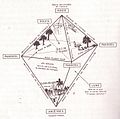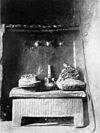Portal:Traditional African religions
Introduction The beliefs and practices of African people are highly diverse, and include various ethnic religions. Generally, these traditions are oral rather than scriptural and are passed down from one generation to another through narratives, songs, and festivals. They include beliefs in spirits and higher and lower gods, sometimes including a supreme being, as well as the veneration of the dead, use of magic, and traditional African medicine. Most religions can be described as animistic with various polytheistic and pantheistic aspects. The role of humanity is generally seen as one of harmonizing nature with the supernatural. (Full article...) Selected articleThere are several deities or mythological figures found in Traditional African religions. Some of these include the Yoruba figure Ogun, the Serer creator god Roog and the Igbo figure Ani. Selected imagesFestivalsThere are several religious festivals found in the various Traditional African religions. Some of these are listed below next to their corresponding religion :
Selected biographyLamane Jegan Joof (or Lamane Djigan Diouf), was a Serer lamane who according to Serer tradition founded the Serer village of Tukar now part of present-day Senegal. The Raan festival (a major event in the Serer religious calendar) takes place each year at Tukar, two weeks after the appearance of the new moon in April. Selected quote
Did you know
Related portalsTopicsFor more Traditional African religion topics, see Category:Traditional African religions.
CategoriesWikiProjectsThings you can doAssociated WikimediaThe following Wikimedia Foundation sister projects provide more on this subject:
Discover Wikipedia using portals |





































